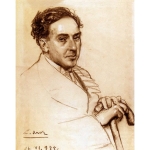The missile to launch a missile
was almost a secret.
Two male Ph.D.’s were picked
and primed to fill it
and one hundred
carefully counted insects,
three almost new snakes,
coiled in a cube,
exactly fifty fish creatures
in tanks, the necessary files,
twenty bars of food, ten brief cures,
special locks, fourteen white rats,
fourteen black rats, a pouch of dirt,
were all stuffed aboard before
the thing blasted from the desert.
And the missile that launched
a missile launched out
into a marvelous scientific balloon
that rolled and bobbed about
in the mists of Venus; suddenly
sank like a sweet fat grape,
oozing past gravity to snuggle
down upon the triumphant shape
of space. The two men signaled
Earth, telling their Continent
VENUS IS GREEN. And parades assembled,
the loud earth tellers spent
all fifteen minutes on it, even
shortened their weather forecast.
But rival nations, angry and oily,
fired up their best atom blast
and the last Earth war was done.
The place became crater on each side,
sank down to its first skull,
shedding forests, oceans, dried
bones and neons, as it fell through
time like a forgotten pitted stone.
These two men walked hopefully out
onto their hot empty planet
with machines, rats, tanks,
boxes, insects and the one odd set
of three almost new snakes,
to make the tests they were meant to do.
But on the seventh month the cages
grew small, too small to interview,
too tight to bear. The rats were gray
and heavy things where they ran
against wire and the snakes built eggs
on eggs and even the fish began
to bump in water as they spawned
on every side of each other’s swim.
And the men grew listless; they opened
the pouch of dirt, undid each locked bin
and let every creature loose
to live on Venus, or anyhow hide
under rocks. Bees swarmed the air,
letting a warm pollen slide
from their wings and onto the grass.
The fish flapped to a small pool
and the rats untangled their hairs
and humped over the vestibule
of the cramped balloon. Trees sprang
from lichen, the rock became a park,
where, even at star-time, things brushed;
even in the planet’s new dark
crotch, that air snag where snakes
coupled and rats rubbed in disrepair,
it grew quick and noisy with
a kind of wonder in the lonely air.
Old and withered, two Ph.D.’s
from Earth hobbled slowly back
to their empty balloon, crying alone
for sense, for the troubling lack
of something they ought to do,
while countless fish slapped
and the waters grew, green came
taller and the happy rats sped
through integrated forests,
barking like dogs at the top
of the sky. But the two men,
that last morning of death, before
the first of light, watched the land
of Venus, its sweetless shore,
and thought, “This is the end.
This is the last of a man like me.”
Until they saw, over the mists
of Venus, two fish creatures stop
on spangled legs and crawl
from the belly of the sea.
And from the planet park
they heard the new fruit drop.



















Comment form: